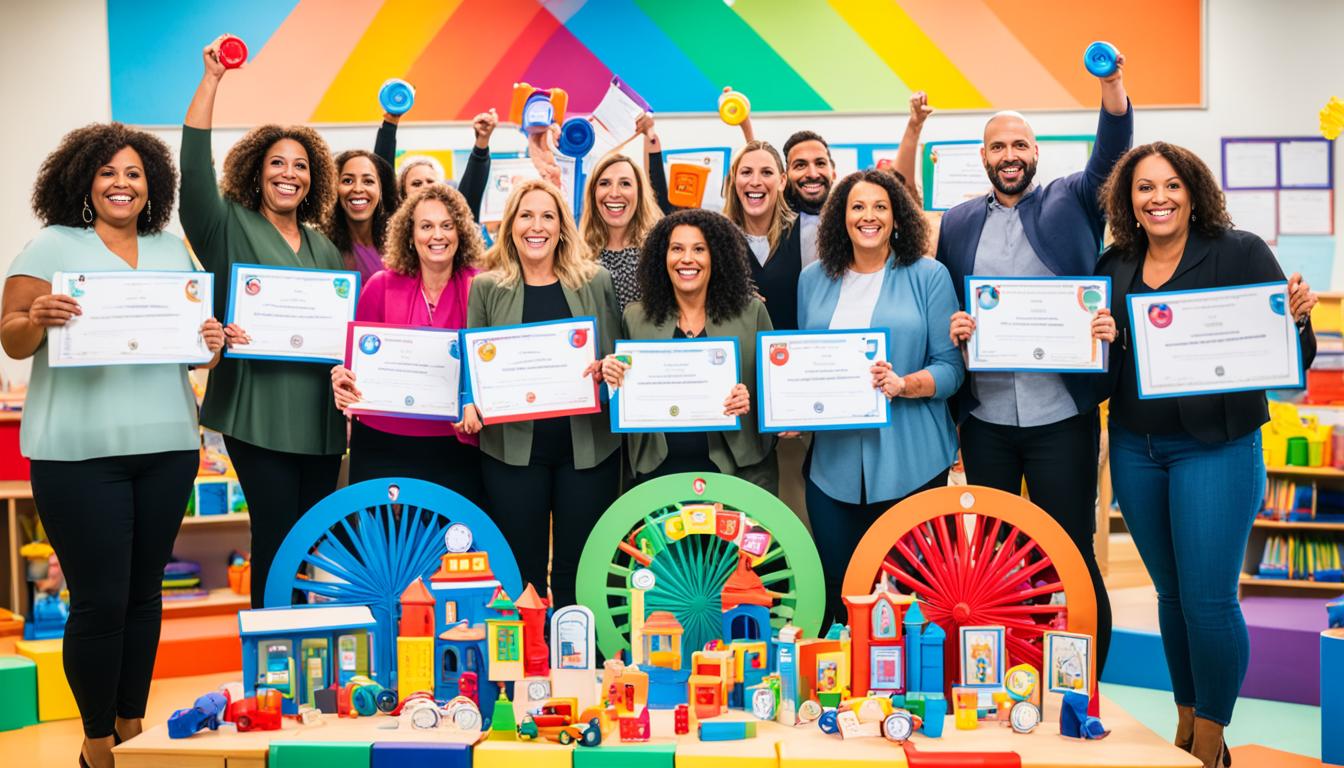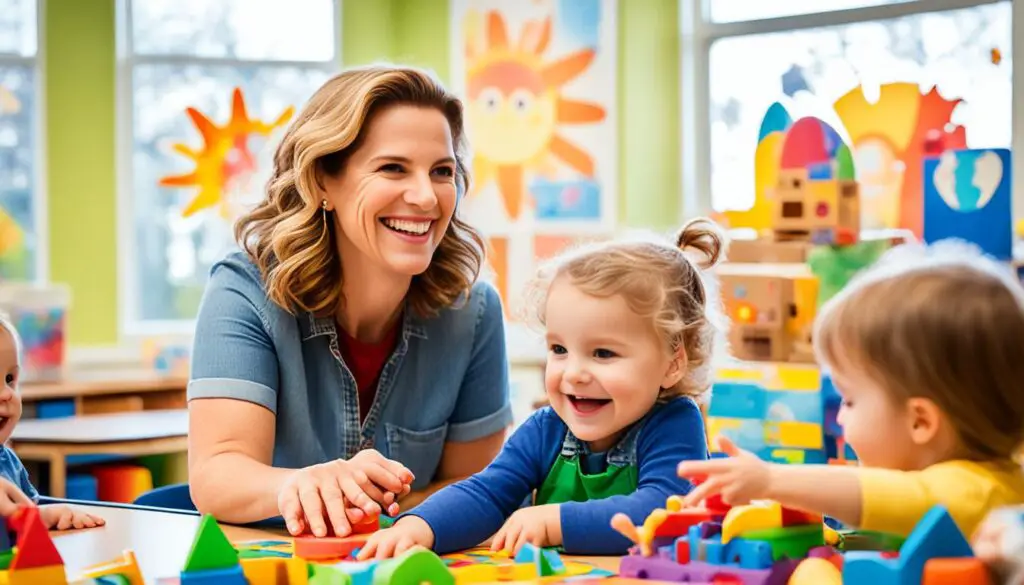
Becoming an Early Childhood Educator: Requirements and Rewards
As an individual passionate about shaping young minds and making a positive impact on children’s lives, becoming an early childhood educator can be a rewarding career choice. This profession requires specific qualifications and offers numerous benefits to those who embark on this path.
Understanding the requirements and rewards of being an early childhood educator is essential for anyone considering this field. By meeting the necessary education and qualification criteria, individuals can pave the way for a successful career in early childhood education.
Education and Qualifications for Early Childhood Educators
Early childhood educators play a vital role in the development and education of young children. To excel in this profession, individuals must meet certain education and qualification requirements that equip them with the necessary knowledge and skills.
The specific requirements for early childhood educators may vary depending on the state and organization. However, there are general minimum education standards that are commonly expected. Typically, individuals are required to possess a high school diploma or an associate’s degree.
In addition to minimum education levels, completion of a recognized early childhood education program is often necessary. These programs provide aspiring educators with a deeper understanding of child development, curriculum planning, and effective teaching strategies. They also expose individuals to various educational theories and methodologies that facilitate the delivery of quality early childhood education.
Some states may also require early childhood educators to obtain certification or licensure. This process ensures that educators meet specific standards and have demonstrated their competence in working with young children. Moreover, it provides reassurance to parents and guardians that their children are in the hands of qualified professionals.
Continuing education and ongoing professional development are vital for early childhood educators to stay updated with current practices and research in the field. By participating in workshops, conferences, and training programs, educators can enhance their skills, expand their knowledge, and incorporate new approaches into their teaching.
Ultimately, the education and qualifications required for early childhood educators reflect the dedication and commitment required to provide excellent care and education to young children. By meeting these requirements and continually expanding their knowledge, educators can create nurturing and stimulating environments for children to learn, grow, and thrive.
The Rewards of Being an Early Childhood Educator
Being an early childhood educator comes with its own set of rewards and benefits. Working with young children and shaping their minds during their formative years can be incredibly fulfilling and rewarding. Early childhood educators have the opportunity to make a positive impact on the lives of children, helping them develop social, emotional, and cognitive skills that will serve as a foundation for their future success.
Additionally, early childhood educators often have the chance to be creative and innovative in designing learning experiences for young children. By using interactive and play-based activities, educators can foster a love for learning and create an environment that promotes exploration and curiosity. This freedom to design and implement engaging lessons allows educators to tap into their own creativity and reap the rewards of watching children thrive and grow.
Nurturing Lifelong Learners
One of the rewards of being an early childhood educator is witnessing the growth and development of the children in their care. Seeing a child grasp a new concept, master a skill, or overcome a challenge is incredibly gratifying. Early childhood educators have the privilege of being a part of children’s educational journey from the start, building a strong educational foundation that will stay with them throughout their lives.
“Being able to guide and witness the growth and progress of young children is truly rewarding. Every day, I have the opportunity to shape their minds, nurture their curiosity, and inspire a love for learning that will last a lifetime.”
Creating Meaningful Connections
The bond that early childhood educators develop with their students and their families is another reward of the profession. As an educator, they become a trusted and reliable source of support for both the child and their parents. Building strong relationships with families allows educators to better understand and meet the individual needs of each child, creating a collaborative and nurturing learning environment.
Making a Difference in the World
Lastly, being an early childhood educator provides an opportunity to make a positive impact on society. By helping children develop the necessary skills and knowledge, educators play a vital role in shaping the future. Early childhood education equips children with the tools they need to become confident, compassionate, and successful individuals who will contribute positively to their communities.

In conclusion, the rewards of being an early childhood educator are immeasurable. Watching children grow, develop, and thrive, creating meaningful connections, and making a lasting impact on society make this profession truly fulfilling and worthwhile.
Conclusion
Becoming an early childhood educator can be a fulfilling and rewarding career choice. While it requires meeting specific education and qualification requirements, the opportunity to make a difference in the lives of young children and contribute to their development makes it a worthwhile pursuit. By understanding the requirements and rewards of being an early childhood educator, individuals can embark on a fulfilling and meaningful journey in the field of early childhood education.
As an early childhood educator, you have the chance to shape young minds during their formative years and help them develop crucial social, emotional, and cognitive skills. This role allows you to be creative and innovative, designing engaging learning experiences for children that foster their growth and curiosity. The joy and satisfaction of witnessing children’s progress and milestones make every day in this profession a source of inspiration.
Furthermore, being an early childhood educator is more than just a job. It is an opportunity to contribute to society by providing a strong foundation for future generations. Your role as an educator is essential in preparing young children for their academic and personal journeys ahead. The impact you make can extend far beyond the classroom, shaping their lives and the communities they will be part of.
FAQ
What are the education and qualification requirements for early childhood educators?
Early childhood educators need to meet certain education and qualification requirements, which typically include a minimum level of education, such as a high school diploma or associate’s degree, and completion of a recognized early childhood education program. Some states may also require certification or licensure.
What rewards and benefits come with being an early childhood educator?
Being an early childhood educator is a highly rewarding profession. Working with young children and shaping their minds during their formative years can be incredibly fulfilling. Early childhood educators have the opportunity to make a positive impact on the lives of children, helping them develop social, emotional, and cognitive skills. The joy and satisfaction of seeing children grow, learn, and reach their milestones make this profession highly rewarding.
How can I embark on a career as an early childhood educator?
To embark on a career as an early childhood educator, you need to meet the specific education and qualification requirements. This typically involves obtaining a minimum level of education, completing a recognized early childhood education program, and, in some states, obtaining certification or licensure. Ongoing professional development and continuing education are also essential for staying updated with the latest practices and research in early childhood education.